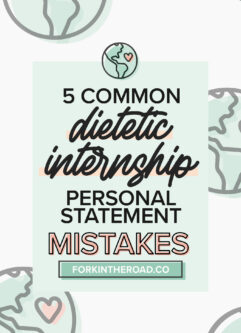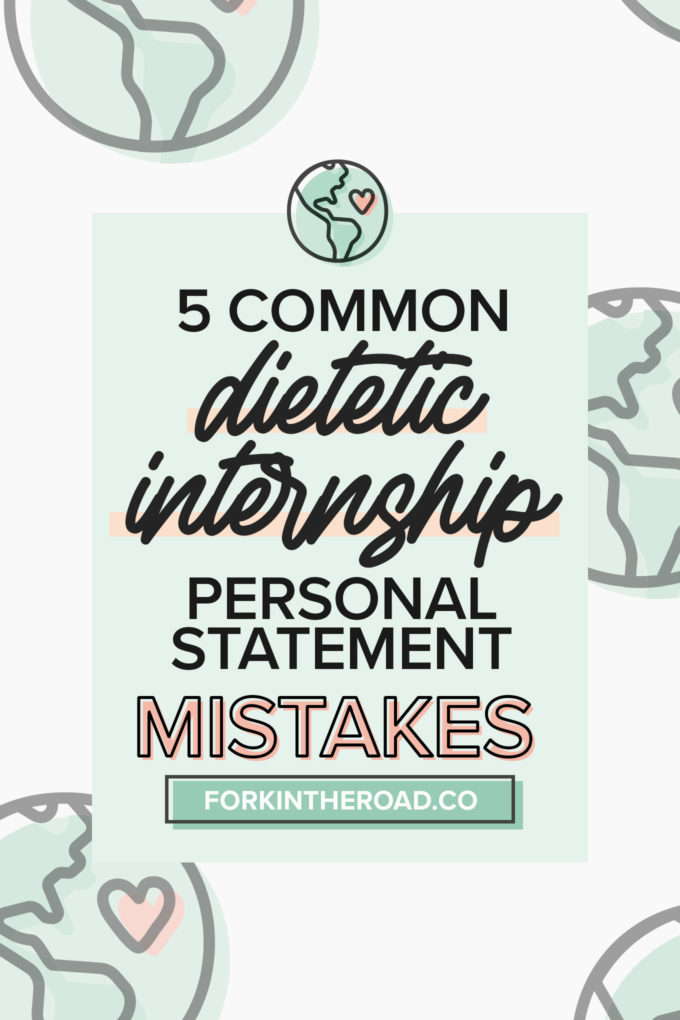

The five most common mistakes nutrition student make on their dietetic internship personal statement. Read this before pressing submit!

Want to Save This Recipe?
Enter your email & I’ll send it to your inbox. Plus, get new plant-based recipes in your inbox!
By submitting this form, you consent to receive emails from Fork in the Road.
UPDATE: This article was originally posted in August 2018 and was updated for clarity and with new information in January 2021.
If you’ve done any research on the dietetic internship application process, you know that having a strong personal statement is an absolute must. In fact, it is one of the most important — if not THE MOST important — part of your DICAS application.
However, if you’re anything like I was when I applied, you have no idea where to start.
I spent weeks writing my dietetic internship personal statement and went through at least ten revisions before pressing submit. Where would I start? How would I catch their attention? What did I want to convey? Why is this so hard.
If this is where you are in the process right now, don’t worry. I’m here to tell you that it can and will come together, you can and will do this.
To help you along this journey, I’ve gathered five of the most common mistakes students make when writing their dietetic internship personal statements in hopes that they will help you to write your most rockstar statement possible!
Table of Contents hideBefore you even sit down to start writing your statement, you MUST do some serious homework about each program you’re applying to.
Consider it your job to know as much as you can before you even do the work of applying. I reached out to everyone I could about the programs I applied to because I needed to know as much as possible to put my best application forward.
You know you want this program, so why would you not want to know every. single. detail. about it before you apply? I’m continually shocked by students who claim they want an internship and then ask questions like, “So when is the application due?”.
It’s super important to know the ins and out of what the program is all about so you can show the director how you are a perfect fit. Knowing the program’s mission and goals will help you to define your purpose for applying.
Here is how to do your homework on potential programs:
I searched everything I could find about my number one choice program. I asked my professors, contacted current and past interns, attended the open house, and met with the director in person.
The day after I pushed submit on the application I went into the restaurant I was working at during undergrad and the director was there eating dinner with her husband!
I was shocked and nervous — and definitely didn’t want to interrupt her dinner — but as she was leaving I reintroduced myself and said hello and she said she saw my face and remembered I had come to see her. I told her I had just applied and hoped to speak with her soon.
Three weeks later I was invited for an interview, and on match day I opened up DICAS and saw I was matched to the program. You just never know!
Like any other piece of writing, your personal statement should have a clear theme and direction.
Deciding upon your direction or end goal before beginning will allow you to make writing decisions that will reflect your theme, making each word and sentence cohesive. Your theme should convey who you are and what you will bring to the internship in one sentence.
Deciding upon your direction or end goal before beginning will allow you to make writing decisions that will reflect your theme, making each word and sentence cohesive.
Let’s say that you are a hardworking, slightly older student with a lot of volunteer experience and lots of passion for food, travel, and global health (hmmm, wonder who that could be?).
Your theme may be, “I am an accomplished, well-rounded applicant that will bring energy, enthusiasm, and maturity to the program.”
Boom. You have a theme.
The sentence doesn’t even need to make an appearance in your statement, it’s just a tool to guide you when writing. Every paragraph you write should consist of examples of why this statement is true.
Don’t just tell directors what you’ve done, tell them who you are and use what you’ve done to back it up.
For me, I knew I was coming into the application process with a lot of experience so it was hard to nail down exactly what I wanted to focus on. Clinical volunteering? Serving meals at a food bank? Being a part of the student dietetic association? My love of travel and foods from around the world?
These are all great potential themes, but how to narrow it down?
I decided I didn’t need to. My theme would be flexibility and maturity. I was a returning student who had been in the workforce for a few years before going back to school; this showed maturity. I had an array of volunteer and work experiences to draw upon; this showed flexibility.
I decided to choose these two descriptive words and some of my strengths (communication, etc.) to begin my paragraphs and then backed up each statement with examples from my past experiences.
Don’t just tell directors what you’ve done by restating the what’s already on your resume, tell them who you are and use what you’ve done to back it up.
Which leads us to…
Your personal statement is exactly that, a statement. You are stating who you are, what you’ve done, and — most importantly — what you will do.
Most so-so personal statements that I’ve read (and even written!) have focused solely on why the writer wants to get into the program and what they’ve done to show for it.
These are essential parts of a good statement, but internship directors can get a full description of what you’ve done easily by looking at your resume and activities section on DICAS (the application portal).
What these mediocre statements are missing is a fully realized description of your goals and how this particular program will help you achieve them.
Now I know that as a student you may not know exactly what you want to do. Hell, some days I don’t know what I want to do now and I’m five years into being a RD!
But internship directors want to know that you have clear goals and why being an intern in their program is going to place you closer to reaching them.
What is it about the program that caught your eye and how does it align with your particular interests? For me, I knew my top choice was the internship I wanted because it would allow me to work with patients with mental illness and at the time I had an interest (and goal!) of working with under served populations.
In my essay I stated my interest in working in mental health, used examples of past experiences with psychiatric patients, and explained how the program would allow me to further explore my interest and prepare me to reach my goals.
I’m an ok writer, I know it. In fact — I’ll be confident — at times I’m pretty damn good.
But that doesn’t mean that I’m too good for a proofreader.
In fact, there is no one that couldn’t benefit from a second (or third, or fourth) set of eyes on the personal statement that may help them get matched to the program the really want.
When you’ve been staring at your own writing for hours, days, and weeks you’re bound to miss something. I’ve read this article three times and I’m sure there are still typos. It’s inevitable.
Pro tip: Take a break, walk away, and then come back and read your statement out loud. You will see-and say-your writing with a fresh pair of eyes.
My advice: have both people familiar to dietetic internships and people who are not read your dietetic internship personal statement.
The people who are familiar with the process will give you pointers about how to structure your statement to make sure you address the questions being asked, while the people who are not familiar with them will be able to catch grammatical and structural errors.
I would highly suggest getting using your university’s writing center or using the help of All Access Internships to make sure your writing is perfect (use the code FORKINTHEROAD to get 20% their Get Matched Course!).
Don’t be shy about your statement, you worked hard to get to this point and you should be proud of the work you’re putting forward. If you don’t feel this way, maybe you’re not being 100% yourself in your writing.
Which brings me to the fifth and final mistake I see often…
Internship directors read a lot of statements. Some programs get well over 100 applications, all from students who badly want to be matched to their program.
So what makes you so special to think you will stand out, huh? No, it’s a serious question. What makes you special? Why are you doing this?
Part of doing your homework is knowing what a director is looking for in applicants, but don’t write only what you think the director wants. What do you really want?
Write 100% from the heart…and you’ll know you did everything you could.
If you’re not genuine in your writing, it will show. You will not be inspired and will end up with a half ass statement, plain and simple.
If you only write hoping you say the perfect things that the director wants to hear and then don’t match, you will always wonder if there was something more you could have done or said.
However, if you define your theme, know your purpose and goals for applying, and write 100% from the heart and then don’t match, you’ll know you did everything you could. You will be bummed, but will know you did your best.
Your personal statement should reflect who you are, that is why it’s called “personal.” You did the work, you’ve gotten this far, and now it’s time show it. You can do this, you will get it done. Do the work and then sit back, relax, and know you gave it your all.
Check out the posts below for more advice, tips, and tricks to make sure you get matched this year!
If you’re ready to start taking your personal statement to the next level but aren’t sure where to start, I recommend using All Access Dietetics! I used All Access coaching as a student and after matching I became a coach myself, so I know firsthand how valuable hiring a coach can be. And you can save 20% off with the code FORKINTHEROAD.
Here are the ways that All Access Dietetics can help you:
Just for Fork in the Road readers! Use the code FORKINTHEROAD to get 20% off the All Access Get Matched Course. If you have any questions about my experience with All Access Dietetics, contact me.
Registered Dietitian Nutritionist
I'm a registered dietitian, working mom, creator of Fork in the Road, and it's my mission to get more people to eat more plants. Join me in taking the "fork in the road" on the path to plant-based living!